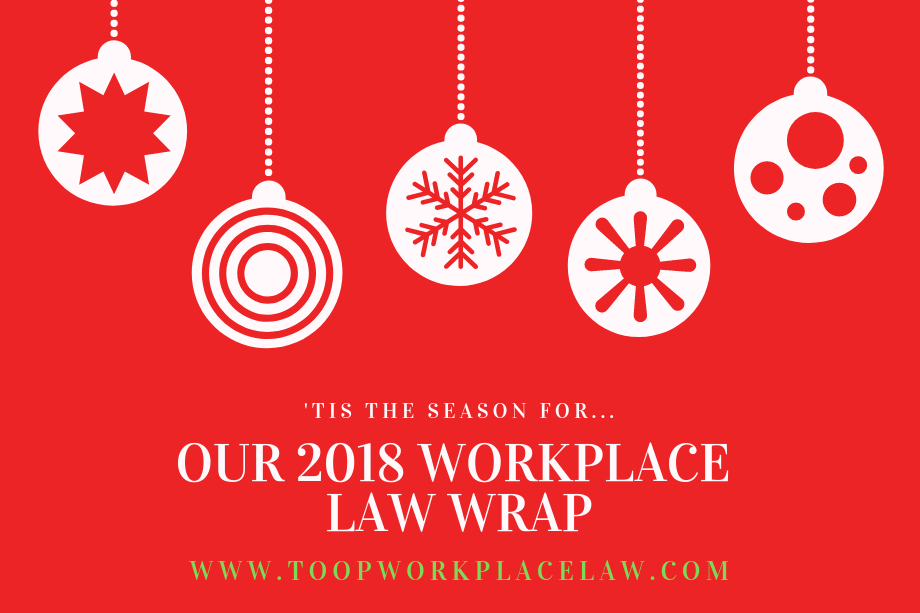2018 Employment Law Wrap

As Christmas approaches, Toop Workplace Law has put together a snapshot of 10 interesting developments in employment law this year – many of which will remain hot topics in 2019.
- The gig workforce continues to attract scrutiny – whilst the Fair Work Commission has found that two Uber drivers were contractors, a Foodora rider was found to be an employee. Separately,the Fair Work Ombudsman launched a prosecution against Foodora alleging sham contracting and underpayments – but the legal action was discontinued after Foodora went into voluntary administration. The tension between new ways of working and the centuries old legal distinction between employees and contractors will only escalate…
- In the wake of the #MeToo movement, which drew attention to the prevalence of sexual harassment and assault on a global scale, in June 2018 a National Inquiry into Sexual Harassment in Australian Workplaces was announced. The inquiry involves public consultation in major cities and regional centres, and will also examine the drivers of sexual harassment at work, the use of technology and current laws and policies. Submissions close on 28 February 2019 and Australia’s Sex Discrimination Commissioner, Kate Jenkins, has called on employers to provide limited waivers of confidentiality obligations to allow victims of harassment to speak to the inquiry.
- Victoria welcomed a new long service leave act– with some significant changes including allowing employees to take long service leave after only seven years and the counting of up to one year of unpaid parental leave as service for LSL purposes. Read more here.
- A decision in an anti-bullying matter by the Fair Work Commission served as a reminder that workplace investigations conducted by lawyers will not necessarily be legally privileged.The Commission ordered the production of an investigation report, rejecting the employer’s argument that it was covered by legal professional privilege. The Commission found that the employer had not articulated with any particularity the legal advisory purpose of commencing the investigation and as such, it had failed to establish that the dominant purpose was to obtain legal advice. Lesson:take care when drafting investigator engagement letters and other communications where an investigation report is sought to be covered by privilege.
- Fewer headaches for those negotiating enterprise agreements (yay!) In December, long awaited amendments to the Fair Work Act 2009 were passed to allow approval of enterprise agreements by the Fair Work Commission despite there being “minor procedural or technical errors” in relation to various procedural steps in the enterprise bargaining process. The Commission must be satisfied that the employees were not likely to have been disadvantaged, which won’t be problematic in the case of the trifling errors that have prevented EA approvals in recent years.
- Modern Awards have been updated in various respects, including the insertion of casual conversion clauses that entitle regular casuals to request to convert to part-time or full-time employment.The Fair Work Commission has also deemed it appropriate for all modern awards to include a clause requiring employers to give a detailed explanation of any refusal to grant a flexible work request. And, unpaid family/domestic violence leave became an entitlement under all modern awards from August (and separately, has since been added to the NES – see #8 below).
- Workpac Pty Ltd v Skene sparked renewed debate over casual employment. The Full Federal Court confirmed the common law test for casual employment; an objective test requiring consideration of the conduct of the parties. Whilst some of the facts of the case were unusual (such as the issuing of a 12-month roster to a ‘casual’), the decision alarmed employer groups as Mr Skene had been paid a higher hourly rate as a casual but was able to recoup payment in respect of accrued but unused annual leave – effectively ‘double dipping’ a casual loading and annual leave. Employer groups are increasingly concerned about the so-called double dipping risk (estimated at up to $8b), whilst the unions have continued their lobbying against the casualisation of work.
- A new unpaid leave entitlement was added to the National Employment Standards – family/domestic violence leave. Whilst of course work must continue on eradicating the need for such leave, the amendments to the Fair Work Act 2009 to confer a leave entitlement should alleviate a small part of the extreme difficulties of those experiencing family/domestic violence,and also draw greater attention to the issue. The Fair Work Ombudsman has published a helpful overview here.
- Labour hire licensing continues to be a moving feast. Whilst various states have introduced licensing regimes over the past year or so, if elected to federal government the ALP plans to introduce a national scheme and ensure labour hire workers receive the same pay and conditions as the direct employees of host employers. Stay tuned…
- In relation to an issue that often arises but is rarely litigated, Swanson v Monash reiterated the longstanding position that sick leave doesn’t release an employee from their obligation to follow lawful and reasonable directions. In that case, the direction was to attend an independent medical assessment to facilitate the employee’s return to work – a direction that is often resisted by employees.
This is general advice only. Liability limited by a scheme approved under Professional Standards Legislation. © 2019 Toop Workplace Law Pty Ltd
